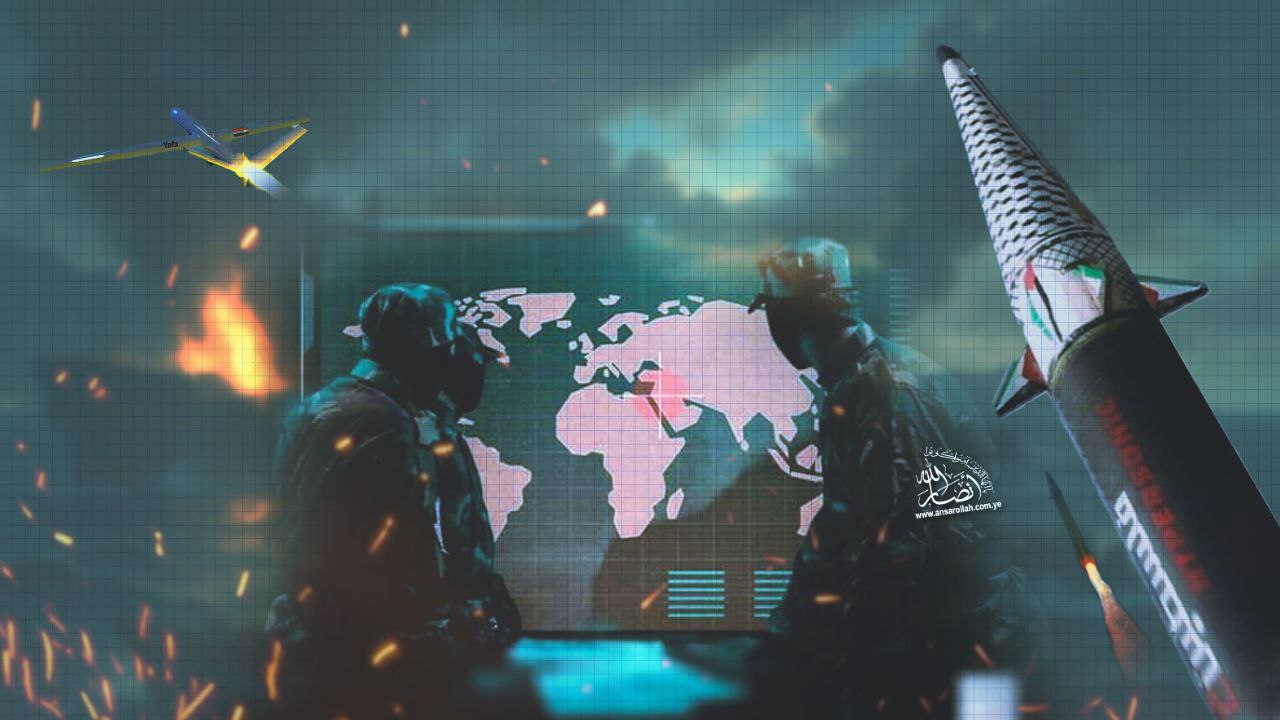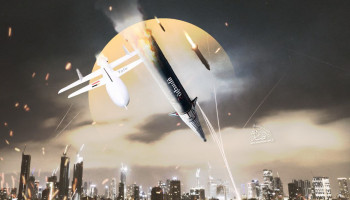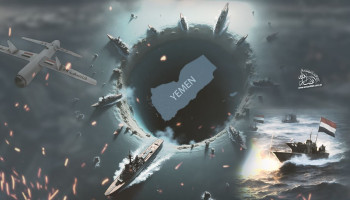Ansarollah Website. Report
At a time when condemnation statements were numerous, crocodile tears were shed, and silence and submission were widespread, Yemen, bombarded by war, its people starved, and Arab states conspired against it, rose up and declared a position that would shake the thrones of treason: "We fight with Palestine, not for applause, but for victory."
When the armies fell silent, Yemen launched its missiles. Yemen did not send "messages of concern" to the enemy, it did not dispatch negotiating committees, and it did not limit itself to prayers. Rather, it launched its drones and ballistic missiles, which crossed the seas and struck deep within the entity, announcing to the world that a true nation does not die, but rises from the ashes. Despite the stifling blockade for years, the war and aggression, and the poverty and destruction, Yemen said: "As long as Gaza is being bombed, we are in a state of war." It did not wait for "Arab permission" or fear a Western threat. It decided to take its natural right as part of a nation whose members are being slaughtered, and to strike the enemy where it hurts. The new equation: a missile from Yemen for a tear from Gaza.
At a time when countries with fleets and aircraft are unable to prevent a shipment of weapons being sent to the enemy, Yemen chose to stand on the front lines, not in conferences; to strike, not to negotiate; to resist, not to evade. Yemen changed the equation of the conflict and proved that those who have the will do not need billions of dollars in weapons, but rather honor, and honor cannot be bought.
Yemen said it clearly: "Our strikes will not cease as long as the aggression against Gaza continues. There will be no appeasement with those who kill children, and no neutrality when it comes to the nation's primary cause."
In a time of apostasy, betrayal, and subservience, Yemen was steadfast, loyal, and resilient. Gaza will remember Yemen as a wounded person remembers a hand that bandaged him, not a hand that applauded his killer. Yemen will be written in history books: "Yemen... did not remain silent, but fought."
Yemen: A Strategic Threat
In light of the Yemeni military operations against the Zionist enemy, whether against its commercial vessels or its vital sites and facilities in occupied Palestine, the Zionists realize that Yemen has become an insurmountable strategic threat. This is especially true after the failure of the US-British "Guardian of Prosperity" coalition and the European "Aspedes" coalition, as well as the repeated Israeli aggression, to effect any change in or limit Yemen's military capabilities. This is despite Yemen having been subjected to more than 2,843 airstrikes and naval bombardments.
Even in the future, the Yemeni position cannot be influenced, given the current state of alert in the country, both officially and popularly, not to mention Yemen's distance from the Israeli entity, as well as the Israeli enemy's lack of accurate information, given its inability to penetrate the Yemeni internal front. The Israeli enemy has acknowledged its inability to reach sensitive military sites in Yemen, given the increasing economic cost of any aggressive operation in terms of ammunition and fuel costs for F-35 and F-16 aircraft. More importantly, the armed forces have revealed their possession of interceptor defense systems that pose a threat to advanced Israeli warplanes. The effects of this threat were evident in the recent Israeli aggression on Hodeidah, after which the enemy preferred to use drones instead of stealth aircraft.
Israel's inability to do so is also evident in Western press reports. The American magazine Foreign Policy described the attempt by ships linked to the Israeli enemy to infiltrate the Red Sea as a risky gamble that could ultimately cost the lives of sailors, especially since recent Yemeni operations have demonstrated a new level of coordination and a clear insistence on sinking ships rather than damaging them. The magazine noted that the risks do not stop there.
The owner of the ship "Eternity Sea" lost tens of millions of dollars after failing to secure war risk insurance, which led other ships to use radios to inform the armed forces of their nationalities.
Technological Penetration
Yemen's achievements were not limited to the Red Sea. They extended to include penetrating deep into the Zionist entity and destroying all its defense systems, including the THAAD and Arrow 1 and 3 missile systems, which were considered the pride of the Israeli defense industry. Despite the limited space and early warning, Yemeni missiles and drones were able to accurately achieve their targets, disrupting daily activity within the entity and tarnishing its regional image as a superpower.
Yemen, despite its modest economic and military capabilities compared to the Zionist enemy and its allies, has managed to bridge the gap, thanks to God, the intelligent minds operating the weapons, the strong defenses, and the nurturing environment. For the first time, the world has witnessed Yemeni ballistic missiles striking moving targets at sea, hypersonic cruise missiles, and drones reaching Jaffa with high precision from very long distances, demonstrating advanced technological capabilities.
This reality raises great concerns for the enemy, as its supply lines across the east are now constantly at risk. The criminal Netanyahu himself described the Yemeni control of Bab al-Mandab Strait as "more dangerous to the Zionists than the Iranian nuclear program," which confirms the strategic importance of this Yemeni achievement.
Washington is busy with rebuilding its forces
According to a report published by the US Naval Institute (USNI) news website, the combat support ship USNS Arctic recently completed one of the most difficult missions in its history, following a nine-month deployment in the Red Sea, where it faced repeated attacks from drones and missiles.
The report quoted Admiral Philip Sobek, commander of the US Navy's military transport fleet, as saying, "We are facing maritime confrontations unlike any we have seen since the 1940s," referring to the military operations carried out by Yemeni forces supporting the Palestinian people in Gaza.
The report added that the Arctic's crew was operating under difficult combat conditions, requiring constant alert to confront successive threats, leading to unprecedented fatigue for both the crew and equipment.The US ship is heading to South Carolina for comprehensive maintenance that will take six months, an exceptional period that reflects the extent of the damage it sustained during its last mission.
This report is an important document revealing the extent of the pressures on US forces in the Red Sea. It also represents an acknowledgment of the effectiveness of Yemeni operations aimed at supporting the Palestinian people in the face of the ongoing Israeli aggression on Gaza.
In the same context, the American newspaper "Business Insider" revealed that the European Union-led naval mission in the Red Sea, called Aspides, is effectively unable to protect shipping lanes, in light of the ongoing escalation by the Yemeni army and the lack of European capacity to secure the sea routes.
According to what the newspaper quoted from Admiral Vasileios Griparis, commander of the European mission, the number of warships participating in the operation does not exceed one ship per day, which he described as insufficient to secure an operational area extending from the Red Sea to the Gulf. A Business Insider report indicated that the recent Yemeni attacks represent a qualitative shift in the maritime landscape, as Sana'a forces were able to sink two ships within a single week, while the United States had committed to halting offensive operations since May under a ceasefire agreement with Sana'a.
The report added that this reality on the ground has embarrassed both Europe and the United States, demonstrating that the so-called "freedom of navigation" is no longer guaranteed in light of the ongoing Yemeni attacks targeting ships heading to Israeli ports or those involved in supporting it.
The report also revealed a lack of coordination between ship-owning companies and the European force. Both Allseas Marine and Cosmoship did not respond to the newspaper's inquiries regarding the reasons for not requesting protection, reflecting the decline in global confidence in the effectiveness of Western efforts in the Red Sea.
Yemen Achieves Its Goals
The conclusion of the battles being waged by Yemen is that the armed forces have succeeded in achieving their goals in light of the complete inability of Israel. Hebrew media outlets have confirmed that the Yemenis have exceptionally succeeded in achieving their goal of closing the port of Umm al-Rashrash, known in Israel as "Eilat." The Hebrew newspaper Maariv acknowledged in a report that the military operations carried out by the Yemeni armed forces have significantly impacted the entity's strategic southern sea gateway, the port of Eilat. The report indicated that this blockade has caused significant waves of tension and severe economic repercussions, noting that the heavy transport sector in the southern part of the entity is suffering significant damage as a result of the port's shutdown. Regarding the ability to disrupt the Zionist interior, the Hebrew economic newspaper Calcalist stated that the Israeli enemy "is finding it difficult to dismantle or deter the Yemeni threat, which lies approximately 2,000 kilometers away and continues to disrupt the lives of millions of Zionist settlers."







